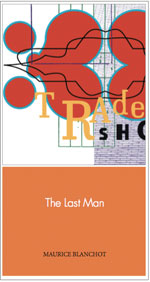
 Download PDF
Download PDF /ubu editions
/ubu editions
 ubuweb
ubuweb
The Last Man (1957)
Maurice Blanchot
73 Pages
We can dream about the last writer, with whom would disappear, without anyone noticing it, the little mystery of writing. A dense, dream-like exploration of the extreme limits of this mystery, written some ten years prior to the Death of the Author, (though unpublished in English until thirty years later) Maurice Blanchot's The Last Man (Le Dernier Homme, 1957) could be considered a narrative follow-up to The Space of Literature (L'Espace littéraire, 1955) or a fictional companion to the critical essays composing The Book to Come (Le Livre à venir, 1959). One can imagine an infinite conversation between these works: drifting wearily across abyssal alterities—the echo, in advance, of what has not been said and will never be said. But this sumptuous récit alone demands the reader's full attention—marvelously, Blanchot writes what cannot be written without losing it as un-writable by writing it (Hans-Yost Frey, YFS, 1998). Narrating at the threshold of this impossible writing, The Last Man weaves a blurring of several prosopopetic characters towards a radical revision of the subject and the text. The prose itself never crystallizes into an unambiguous statement—Blanchot's trangressive philosophy peculiar in the tantalizingly pleasurable suspension of the never-fulfilled promise of understanding. Reading happens in this continual absence of comprehension: instead, dense knots of delightfully paradoxical propositions and stupefying catachreses drive the reader on in the unconditional acceptance of the text that pierces, like a look that is too direct, the indeterminate prose, and makes all relations, and especially our relationship to time, absolutely precarious.